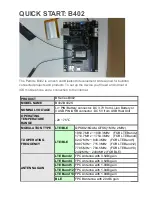
SYSTEM ARCHITECTURE
SNAP PAC R-Series Controller User’s Guide
24
For more information on using PAC Control commands for peer-to-peer communication,
see “Communication Commands” in Chapter 10 of the
PAC Control User’s Guide
and
individual commands in the
PAC Control Command Reference
.
If you are not using PAC Control but writing your own software applications to access the
Scratch Pad areas, see the
OptoMMP Protocol Guide
. This guide is written for I/O units, but
much of the same information on programming applies to SNAP PAC controllers. The
Scratch Pad areas of the memory map are described in the programming guide’s appendix.
Communicating with Enterprise Systems and Third-Party
Software
In addition to its capabilities in I/O, control, and peer-to-peer communication, the SNAP PAC
R-series I/O system can also interface directly with enterprise systems and third-party
software that need to use its data. The following graphic shows how these software
applications (and some hardware, too) can directly access the memory map in the
controller’s I/O side for both I/O point data and strategy variable data.
All protocols except FTP
can also read strategy
variable data from the
Scratch Pad area of the
Memory Map.
All protocols except
FTP can read or
write to I/O points
directly through the
Memory Map.
SNAP PAC R-series
controller
I/O Side
Read/write to points
using Memory Map
Control Side
Run PAC Control flowcharts
Fixed memory area
(I/O point data)
Paging
Scratch pad area
(strategy variable data)
Modbus/TCP
hardware and
software
File system
Enterprise
database
Any OPC
client software
3rd-party
software
•
Intellution
•
Wonderware
ActiveX
custom
application
(VB, C, C++,
database)
Enterprise
management
system
SMTP
SNMP
Modbus/TCP
1394-based
OPC
FTP
















































